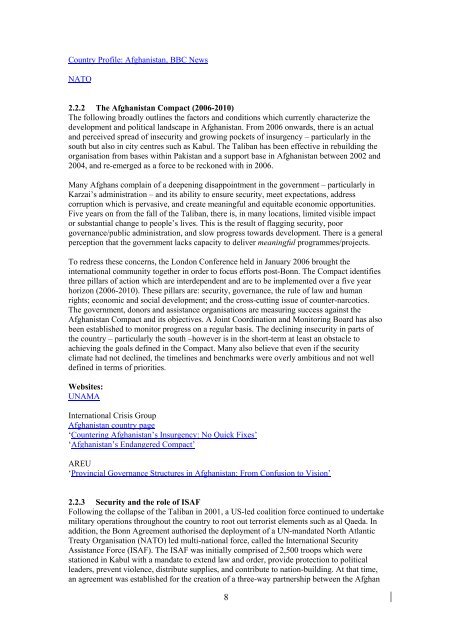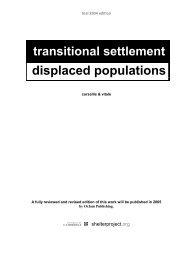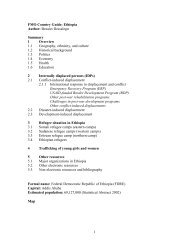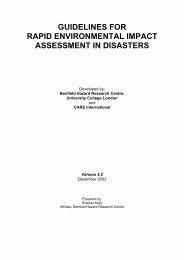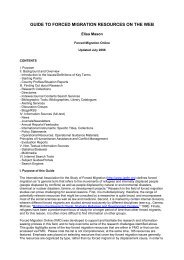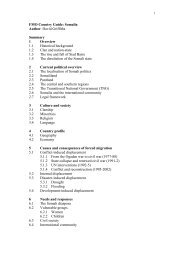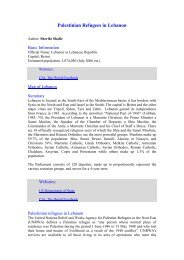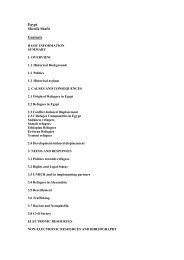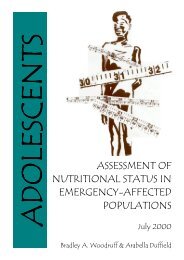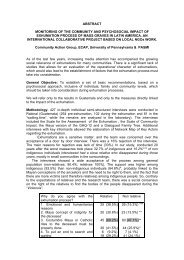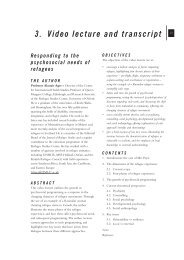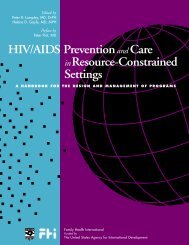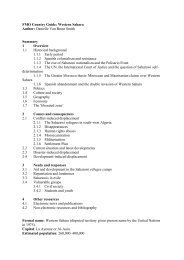Afghanistan. - Forced Migration Online
Afghanistan. - Forced Migration Online
Afghanistan. - Forced Migration Online
You also want an ePaper? Increase the reach of your titles
YUMPU automatically turns print PDFs into web optimized ePapers that Google loves.
Country Profile: <strong>Afghanistan</strong>, BBC News<br />
NATO<br />
2.2.2 The <strong>Afghanistan</strong> Compact (2006-2010)<br />
The following broadly outlines the factors and conditions which currently characterize the<br />
development and political landscape in <strong>Afghanistan</strong>. From 2006 onwards, there is an actual<br />
and perceived spread of insecurity and growing pockets of insurgency – particularly in the<br />
south but also in city centres such as Kabul. The Taliban has been effective in rebuilding the<br />
organisation from bases within Pakistan and a support base in <strong>Afghanistan</strong> between 2002 and<br />
2004, and re-emerged as a force to be reckoned with in 2006.<br />
Many Afghans complain of a deepening disappointment in the government – particularly in<br />
Karzai’s administration – and its ability to ensure security, meet expectations, address<br />
corruption which is pervasive, and create meaningful and equitable economic opportunities.<br />
Five years on from the fall of the Taliban, there is, in many locations, limited visible impact<br />
or substantial change to people’s lives. This is the result of flagging security, poor<br />
governance/public administration, and slow progress towards development. There is a general<br />
perception that the government lacks capacity to deliver meaningful programmes/projects.<br />
To redress these concerns, the London Conference held in January 2006 brought the<br />
international community together in order to focus efforts post-Bonn. The Compact identifies<br />
three pillars of action which are interdependent and are to be implemented over a five year<br />
horizon (2006-2010). These pillars are: security, governance, the rule of law and human<br />
rights; economic and social development; and the cross-cutting issue of counter-narcotics.<br />
The government, donors and assistance organisations are measuring success against the<br />
<strong>Afghanistan</strong> Compact and its objectives. A Joint Coordination and Monitoring Board has also<br />
been established to monitor progress on a regular basis. The declining insecurity in parts of<br />
the country – particularly the south –however is in the short-term at least an obstacle to<br />
achieving the goals defined in the Compact. Many also believe that even if the security<br />
climate had not declined, the timelines and benchmarks were overly ambitious and not well<br />
defined in terms of priorities.<br />
Websites:<br />
UNAMA<br />
International Crisis Group<br />
<strong>Afghanistan</strong> country page<br />
‘Countering <strong>Afghanistan</strong>’s Insurgency: No Quick Fixes’<br />
‘<strong>Afghanistan</strong>’s Endangered Compact’<br />
AREU<br />
‘Provincial Governance Structures in <strong>Afghanistan</strong>: From Confusion to Vision’<br />
2.2.3 Security and the role of ISAF<br />
Following the collapse of the Taliban in 2001, a US-led coalition force continued to undertake<br />
military operations throughout the country to root out terrorist elements such as al Qaeda. In<br />
addition, the Bonn Agreement authorised the deployment of a UN-mandated North Atlantic<br />
Treaty Organisation (NATO) led multi-national force, called the International Security<br />
Assistance Force (ISAF). The ISAF was initially comprised of 2,500 troops which were<br />
stationed in Kabul with a mandate to extend law and order, provide protection to political<br />
leaders, prevent violence, distribute supplies, and contribute to nation-building. At that time,<br />
an agreement was established for the creation of a three-way partnership between the Afghan<br />
8


